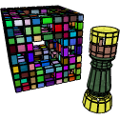|
CGAL 4.6 - Linear Cell Complex
|
|
CGAL 4.6 - Linear Cell Complex
|

CGAL::Linear_cell_complex<d,d2,LCCTraits,Items,Alloc>CGAL::Linear_cell_complex_min_items<d>CGAL::Linear_cell_complex_traits<d,K>CGAL::Cell_attribute_with_point<LCC,Info_,Tag,OnMerge,OnSplit>CGAL::import_from_plane_graph<LCC>CGAL::import_from_triangulation_3<LCC,Triangulation>CGAL::import_from_polyhedron_3<LCC,Polyhedron>Modules | |
| Concepts | |
| Classes | |
| Constructions for Linear Cell Complex | |
| Basic constructions. | |
| Operations for Linear Cell Complex | |
| High-level operations. | |